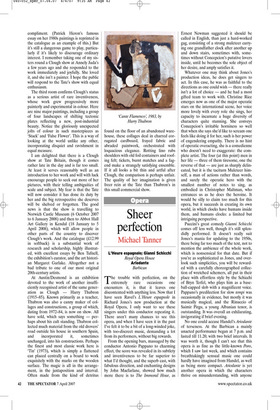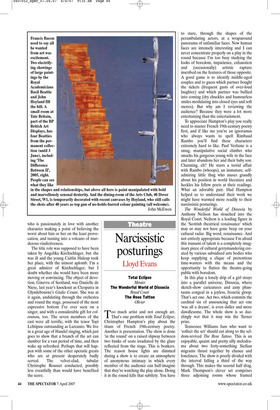Sheer perfection
Michael Tanner
L’Heure espagnole; Gianni Schicchi Royal Opera House Ariodante Barbican
The trouble with perfection, on the extremely rare occasions one encounters it, is that it leaves one discontented with anything less. Now that I have seen Ravel’s L’Heure espagnole in Richard Jones’s new production at the Royal Opera, I only want to see these singers under this conductor repeating it. There aren’t many chances to see this opera, and when I have seen it in the past I’ve felt it to be a bit of a long-winded joke, with too-discreet music, demanding a lot from its performers, without big rewards.
From the opening bars, massaged by the conductor Antonio Pappano to charming effect, the score was revealed in its subtlety and inventiveness to be far superior to what I’d thought, and the superb cast, with fabulous direction, and enchanting designs by John Macfarlane, showed how much more there is to The Immoral Hour, as Ernest Newman suggested it should be called in English, than just a hard-worked gag, consisting of a strong muleteer carrying one grandfather clock after another up and down stairs, sometimes with, sometimes without Concepcion’s putative lovers inside, until he becomes the sole object of her desire, and amply satisfies it.
Whatever one may think about Jones’s production ideas, he does get singers to act. In this case, he was as faithful to the directions as one could wish — there really isn’t a lot of choice — and he had a most gifted team to work with. Christine Rice emerges now as one of the major operatic stars on the international scene, her voice more lovely with every role she sings, her capacity to incarnate a huge diversity of characters quite stunning. She conveys Concepcion’s irritable horniness so well that when she says she’d like to scream one feels like doing it for her, such is her power of engendering empathy. There is no hint of operatic overacting, she is a comedienne who doesn’t need to exaggerate: the complete artist. The four (at this point) men in her life — three of them tiresome, one the reverse of that — are just as sharply delineated, but it is the taciturn Muleteer himself, a man of actions rather than words, and surely the operatic hero with the smallest number of notes to sing, as embodied in Christopher Maltman, who entrances us as he does the heroine. It would be silly to claim too much for this opera, but it succeeds in creating its own world, in which clocks have humans inside them, and humans clocks: a limited but intriguing perspective.
Puccini’s great comedy Gianni Schicchi comes off less well, though it’s still splendidly performed. It doesn’t really suit Jones’s mania for updating to the 1950s, there being far too much of the text, not to mention the ambience of the whole work, which is nonsensical for that date. But if you’re as sophisticated as Jones, and overlook such simplicities, you will be rewarded with a carefully choreographed collection of wretched schemers, all put in their place with effortless style by the Schicchi of Bryn Terfel, who plays him as a baseball-capped slob with a magnificent voice. Pappano’s predilection for slow tempi was occasionally in evidence, but mostly it was musically magical, and the Rinuccio of Saimir Pirgu, a young Albanian tenor, is outstanding. It was overall an exhilarating, invigorating if brief evening.
No one could accuse Handel’s Ariodante of terseness. At the Barbican a mainly unacted performance began at 7 p.m. and lasted till 11.20, with two brief intervals. It was worth it, though I can’t see that this opera is as fine as the little-known Poro, which I saw last week, and which contains breathtakingly sensual music one could hardly have imagined from Handel, as well as being more compact. Ariodante is yet another opera in which the characters thrive on misunderstanding, with anyone who is passionately in love with another character making a point of believing the worst about him or her on the least provocation, and turning into a volcano of murderous vindictiveness.
The title role was supposed to have been taken by Angelika Kirchschlager, but she was ill and the young Caitlin Hulcup took her place, with the utmost aplomb. I’m a great admirer of Kirchschlager, but I doubt whether she would have been more moving or convincing. The object of devotion, Ginevra of Scotland, was Danielle de Niese, last year’s knockout as Cleopatra in Glyndebourne’s Giulio Cesare. She was at it again, undulating through the orchestra and round the stage, possessed of the most expressive bottom I’ve ever seen on a singer, and with a considerable gift for coloratura, too. The seven members of the cast were all terrific, with the tenor Topi Lehtipuu outstanding as Lurcanio. We live in a great age of Handel singing, which just goes to show that a branch of the art can slumber for a vast period of time, and then wake up refreshed. Perhaps that will happen with some of the other operatic greats who are at present desperately badly served. The velvet-clad, tubular Christophe Rousset conducted, possibly less eventfully than would have benefited the score.



































































 Previous page
Previous page